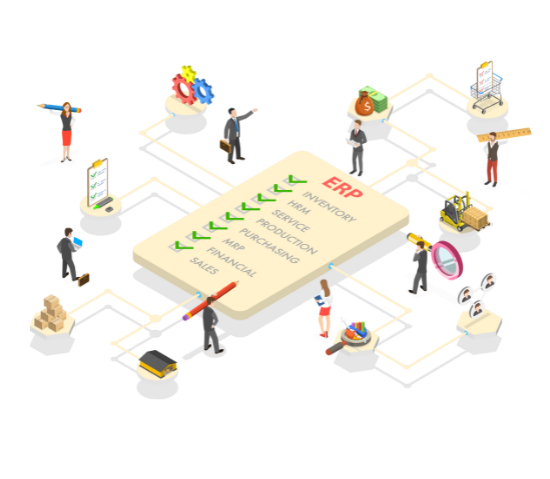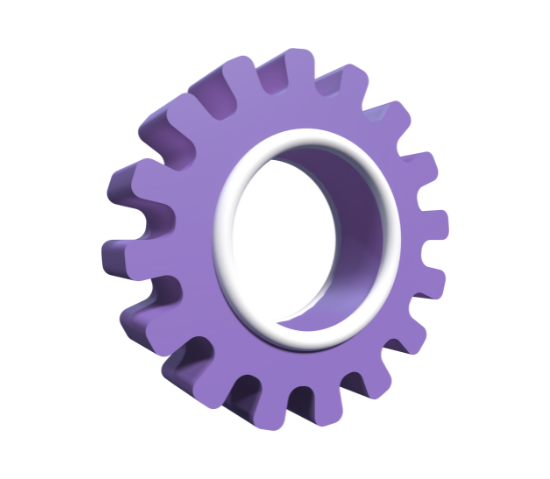- Mumbai Central & Mira Road
- +(91) 98333 44 333
- sales@globalteckz.com

Difference between ERP & Enterprise Systems
ERP and Enterprise Management System also known as EMS both are used interchangeably. In this blog post we will clear misunderstanding between both the solution. Many times people get confused with both the terminology. The major differences in both the software is when it comes to technical and functional aspects.
Explore how ERP software fits within the broader landscape of enterprise systems. While ERP focuses on integrating core business processes like finance, HR, and inventory management, enterprise systems encompass a wider range of applications, including CRM, supply chain, analytics, and more. Learn which solution aligns best with your business goals and drives efficiency across your organization.”
What is an
ERP software
ERP (Enterprise Resource Planning) software is a business application that provides solutions to various departments through individual modules. In contrast, Enterprise Systems encompass a broader range of applications, including ERP, Supply Chain Management (SCM), Customer Relationship Management (CRM), and more.
An ERP software focuses on enhancing internal business functions, streamlining processes, and ensuring real-time, accurate data across departments. Enterprise Systems, on the other hand, are designed to manage both internal operations and external interactions with suppliers, customers, and partners.
ERP covers the entire internal process flow, providing precise data for operational efficiency. Enterprise Systems support strategic decision-making, such as sourcing raw materials, analyzing profitability, ensuring timely deliveries, and improving customer retention.

What an ERP system
Helps you with
An ERP systems track business resources (such as cash, raw materials, and production capacity) and the status of commitments made by the business (such as customer orders, purchase orders, and employee payroll), no matter which department (manufacturing, purchasing, sales, accounting, and so on) has entered the data into the system. ERP facilitates information flow between all business functions inside the organization, and manages connections to outside stakeholders. - Source Wikipedia

What is an
Enterprise Systems
Enterprise Systems (ES) are large-scale software applications designed to support and integrate a wide range of business processes across an organization. They facilitate the seamless flow of information, improve collaboration between departments, and enable data-driven decision-making. ES are typically used by large organizations that have complex operations spanning multiple functions, divisions, or geographies.
EMS integrate core business processes such as finance, human resources, supply chain, customer relationship management, production, and logistics. This ensures that information flows seamlessly between departments.
It consolidate data from various sources into a single repository, enabling accurate reporting and analytics. This helps organizations make timely, informed decisions.
What an EMS
helps you with
An Enterprise Management systems are more data focused that tracks and control all your complex operations of an organization. These tracking by Enterprise system helps management to take powerful business decision through convenient reports and data.
A clear comparison between ERP systems and broader Enterprise Systems highlighting scope, purpose, customization, and implementation.
| Feature | ERP System | Enterprise Systems |
|---|---|---|
| Scope | Internal business processes (modules for Finance, HR, Sales, Inventory) | Broader scope: ERP + SCM + CRM + other external/internal processes |
| Purpose | Enhances internal operations and departmental workflows | Supports both internal operations and external interactions with suppliers, partners, and customers |
| Data & Process Coverage | Real-time, accurate internal data; covers complete internal processes | Decision support for sourcing, profitability, timely delivery, customer retention |
| Architecture & Database | Structured database and defined architecture | No fixed architecture; uses available organizational data across functions |
| Customization | Modules can be customized per business requirements | Usually minimal or no customization; businesses adapt to system workflows |
| Implementation Time | Faster (focus on internal processes) | Longer (large-scale data collection and external integration) |
| Organization Size | Small, Medium, Large | Typically Large organizations |
| Risk of Failure | Lower due to structured modules and database | Higher due to complex integration and large data volume |
Conclusion - ERP vs Enterprise Systems
Since both ERP software and EMS have similar goals towards the productivity of an Organization. They both have technical differences and architecture. ERP software ensure the proper feeding of data whereas, Enterprise system leverage the available data. ERP system can be implemented quickly as due to module requirements organization can opt for the list of module they need in their business whereas EMS system take long time to launch and implement. To end our Blog post we can summarize in few words the differentiation between ERP and ES “Where ERP functionality ends the role of ES begins.”
For further information, contact us at sales@globalteckz.com

Globalteckz is one of the leading Odoo integrators and ERP service providers in India, offering expert solutions in Odoo, ERPNext, and business automation for startups and enterprises. With a skilled team, we deliver customized ERP implementation, integration, and support services to streamline operations and drive digital transformation across India, UAE, USA, Canada, and the UK.
Let’s Meet Together
Mira Road Location: Unit 002, Building A7, Sector 5, Mira Road (East), Thane, Mumbai – 401107.
Call/WhatsApp:
+(91) 9833344333
+(91) 9773530597
Email: sales@globalteckz.com
Teams/Skype
kadriazhar | abraar.patel
Copyright © 2025 | Globalteckz - (India & USA). All rights reserved. | Terms and Conditions




